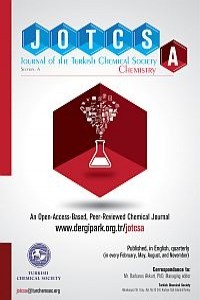Usage of Cellulose Acetate Butyrate Based Oligomeric Structures on Cotton Fabric Coatings
In this study, the hydroxyl groups of cellulose acetate butyrate (CAB) oligomer were reacted with toluene diisocyanate-hydroxyethyl methacrylate (TDI-HEMA) adduct, in order to improve properties of CAB such as flexibility, thermal stability etc. Then the obtained modified CAB oligomer was characterized by FTIR and 1H NMR analysis. UV-curable coating formulations were prepared by using the modified CAB oligomer, and then applied on cotton fabrics in order to reinforce cotton fabrics and make them durable to outdoor environments. Cotton fabrics were treated with a commercial washing detergent, alkali solution, and an enzyme prior to the UV-coating, in order to increase the adhesion between the cotton fabric and coating layer. Washed and coated fabrics were evaluated in terms of absorbency, tensile, and adhesion properties, respectively. Light microscopy was employed to observe the effects of washing processes on fibre, and to show the abrasion deformation on coated fabric. Results proved that the best washing process in fibrillation was found as enzymatic washing due to the having the highest adhesion strength and the least deformation against abrasion.
___
- 1. Çakmakçı E, Güngör A, Kayaman-Apohan N, Kuruca SE, Çetin MB, Dar KA. Cell growth on in situ photo-cross-linked electrospun acrylated cellulose acetate butyrate. Journal of Biomaterials Science, Polymer Edition. 2012;23(7):887-99.
- 2. Wang X, Huang S, Wang Y, Wei P, Chen Y, Xia Y, et al. Eco-friendly cellulose acetate butyrate/poly (butylene succinate) blends: crystallization, miscibility, thermostability, rheological and mechanical properties. Journal of Polymer Research. 2017;24(2):16.
- 3. Biniaś W, Biniaś D. Formation of Microfibres from Cellulose Acetate Butyrate by Electrospinning with a Surface Modified in Low-temperature Plasma. Fibres & Textiles in Eastern Europe. 2014.
- 4. Barszczewska-Rybarek IM. Characterization of urethane-dimethacrylate derivatives as alternative monomers for the restorative composite matrix. Dental Materials. 2014;30(12):1336-44.
- 5. Lei G, Angeli S, Kristol D, Snyder W. Preparation of new blocked diisocyanate for dental application. Journal of Polymer Science Part A: Polymer Chemistry. 1987;25(2):607-15.
- 6. Wang SJ, Wang YL, Yang PF, Li TD, editors. Preparation of polyurethane-poly (butyl acrylate) hybrid latexes via miniemulsion polymerization. Applied Mechanics and Materials; 2012: Trans Tech Publ.
- 7. Wang F, Hu J, Tu W. Study on microstructure of UV-curable polyurethane acrylate films. Progress in organic coatings. 2008;62(3):245-50.
- 8. Xie J, Zhang N, Guers M, Varadan VK. Ultraviolet-curable polymers with chemically bonded carbon nanotubes for microelectromechanical system applications. Smart materials and structures. 2002;11(4):575.
- 9. Liu X-D, Sheng D-K, Gao X-M, Li T-B, Yang Y-M. UV-assisted surface modification of PET fiber for adhesion improvement. Applied Surface Science. 2013;264:61-9.
- 10. Eker P. Farklı Hammaddeler İçeren Lycralı Dokuma Kumaşlarda Biyo-Parlatma ve Biyo-Parlatmanın Kumaş Performansına Etkileri. Adana2012.
- 11. Ozgen H. Farklı Yöntemlerle Pamuklu Örme Kumaşın Enzimatik Hidrofilleştirilmesi. Bartın2018.
- 12. Stanescu MD, Dochia M, Radu D, Sirghie C. Green solution for cotton scouring. Fibres & Textiles in Eastern Europe. 2010;18(3):80.
- 13. SANCAR B, PAKSOY N, BALCI O, KURTOĞLU N. Pamuklu Dokuma Kumaşların Boyamaya Hazırlık İşlemlerinde Enzim Kullanım Olanaklarının İncelenmesi ve Kombine Proses Geliştirilmesi. Tekstil ve Mühendis. 2012;19(86).
- 14. Toprak T. Pamuklu Kumaşlarda Kombine Enzim Proseslerinin Geliştirilmesi. Bursa2014.
- 15. Davulcu A. Pamuklu Kumaşların Ön Terbiye Proseslerinin Enzimatik Yöntemlerle Kombine Edilmesi Üzerine Bir Araştırma. Bursa2008.
- 16. Duran K, Bozacı E, Karahan H. Protein Esaslı Mamüllerin Enzimatik ÖnTerbiyesi. Tekstil ve Konfeksiyon. 2007;3:187-92.
- 17. Yılmaz B. Selülozik Materyallerin Tek Banyoda Kombine Proses ile Boyanmasında Optimizasyon. Istanbul2004.
- 18. Donelli I, Freddi G, Nierstrasz VA, Taddei P. Surface structure and properties of poly-(ethylene terephthalate) hydrolyzed by alkali and cutinase. Polymer Degradation and Stability. 2010;95(9):1542-50.
- 19. AATCC TM79-2018, Absorbency of Textiles. 2018.
- 20. TS EN ISO 13934-1:Tekstil - Kumaşların gerilme özellikleri - Bölüm 1:En büyük kuvvetin ve en büyük kuvvet altında boyca uzamanın şerit yöntemiyle tayini. 2013.
- 21. TS EN ISO 5470-2:Lastik veya plastik kaplı kumaşlar-Aşınma dayanımının tayini-Böllüm 2:Martindale aşındırıcı. 2004.
- 22. TS EN ISO 12947-2:Tekstil - Martindale metoduyla kumaşların aşınmaya karşı dayanımının tayini- Bölüm 2: Numune kopmasının tayini. 2017.
- 23. ASTM D1876–08: Standard Test Method for Peel Resistance of Adhesives (T-Peel Test). ASTM International: West Conshohocken, PA; 2015.
- 24. Grepinet B, Pla F, Hobbes P, Swaels P, Monge T. Modeling and simulation of urethane acrylates synthesis. I. Kinetics of uncatalyzed reaction of toluene diisocyanate with a monoalcohol. Journal of applied polymer science. 2000;75(5):705-12.
- 25. Liao F, Zeng X-r, Li H-q, Lai X-j, Zhao F-c. Synthesis and properties of UV curable polyurethane acrylates based on two different hydroxyethyl acrylates. Journal of Central South University. 2012;19(4):911-7.
- 26. Tan SZ, Wang Y, Zhang YF, Zhou WL, editors. Preparation of a novel prepolymer of polyurethane acrylate. Advanced Materials Research; 2012: Trans Tech Publ.
- 27. Dong Y, Edgar KJ. Imparting functional variety to cellulose ethers via olefin cross-metathesis. Polymer Chemistry. 2015;6(20):3816-27.
- 28. Dong Y, Mosquera-Giraldo LI, Troutman J, Skogstad B, Taylor LS, Edgar KJ. Amphiphilic hydroxyalkyl cellulose derivatives for amorphous solid dispersion prepared by olefin cross-metathesis. Polymer Chemistry. 2016;7(30):4953-63.
- 29. Kunwong D, Sumanochitraporn N, Kaewpirom S. Curing behavior of a UV-curable coating based on urethane acrylate oligomer: the influence of reactive monomers. Sonklanakarin Journal of Science and Technology. 2011;33(2):201.
- Başlangıç: 2014
- Yayıncı: Türkiye Kimya Derneği
